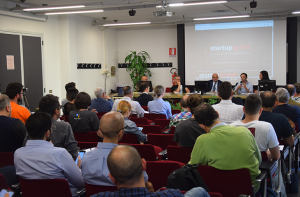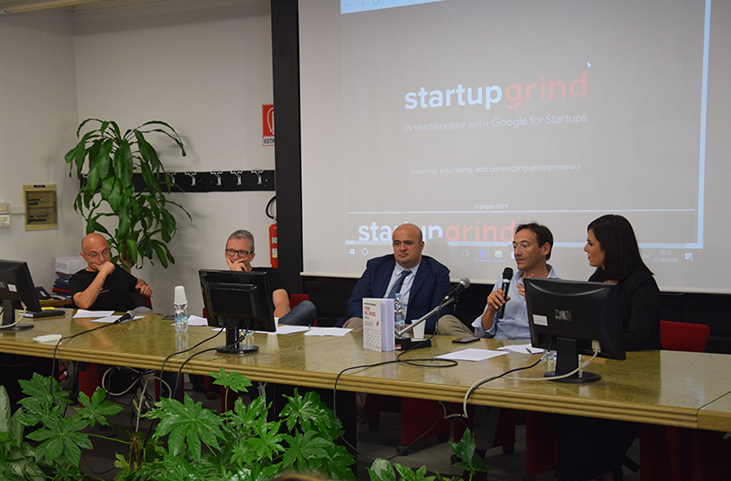At the event on 5 June 2019 organised by Startup Grind, attended by Partitalia, the topic was Research and Venture Capitalism in support of Innovation.
Partitalia and collaborations with research centers of excellence
Research is a central aspect of Partitalia's work. In fact, the company invests more than 7% of its annual turnover in R&D, equal to approximately 4,659 million euros (source: 2018 Financial Statements). In particular, in the three-year period 2016-2018, attention to Research and Development led to an increase of more than 25% in turnover; in the same period, 8 people were involved in R&D, one of which was totally involved in innovation projects, focused on production - optimized with robots and remote control systems - and on product evolution - through the introduction of new technologies wearables for collecting data with RFID (Radio-Frequency IDentification) technology.
Collaborations with Research Centers
Starting from 2017, Partitalia has selected three internationally renowned universities for R&D activities:
– The Scuola Superiore Sant'Anna of Pisa , a public university with a special statute which operates in the field of applied sciences and which has been carrying out research in mobile robotics for years: the Perceptual Robotics Laboratory (PERCRO) has been active within it since 1991 , which develops advanced interaction technologies to make communication between humans and the reactive environment more effective.
The activity includes the development of intelligent automation systems and immersive visualization systems, the study and design of new human-robot collaborative interfaces;the usability of these resources is evaluated in various fields of application, from medicine to maintenance, from industrial training to energy, up to training and cultural communication. The company is working with Scuola Sant'Anna to acquire skills in robotics and its use in logistics, by combining this discipline with different technologies in the sensor sector.
– The University of Pisa , specifically the Department of Information Engineering (DII) , which represents an international reference for many of the ICT technologies – electronics, information technology, telecommunications, biomedical, applied electromagnetism, wireless systems, digital electronics, networking, embedded systems , artificial intelligence systems. The collaboration takes place mainly within the Crosslab "Industrial Internet of Things" of the DII, in which a research group is active that deals with the design of RFID systems and antennas, the development and implementation of advanced radiolocation systems, wearable.
– The Polytechnic of Milan . The synergy with Partitalia began in March 2018, with a research project on the wearability of RFID readers, which is still ongoing. The strategic partnership with the Politecnico di Milano, which has great technological and methodological experience in the smart textiles sector, integrates and completes Partitalia's skills in the technological field.
Partitalia partner of Startup Grind Pisa & Lucca
On June 5th focus on Venture Capital to support innovation
Since December 2018, Partitalia has turned its attention to Tuscany – where collaborations are already active with the Scuola Superiore Sant'Anna and the University of Pisa – by joining the Startup Grind network , the independent community of innovators in partnership with Google for Startups , present in more than 400 cities and in 125 countries worldwide.


Luca Del Col Balletto , CEO and founder of Partitalia, together with Salvatore Rosania holds the role of co-director of the chapter for the Pisa and Lucca area , particularly fertile in terms of research, thanks to the presence of the Technological Poles - the Polo of Navacchio and the Lucchese area – where numerous companies and startups work on the themes of innovation and
The goal of Startup Grind Pisa & Lucca is to grow the value of the territory through the community and networking with a view to Open Innovation , attracting capital and international attention to one of the most fervent areas in Italy for the quality and quantity of talent present , for the number of patents, for the scientific research produced. And the event “Venture Capital in support of Italian innovation. How to think and act Outside the flock”, organized by Startup Grind Pisa&Lucca in collaboration with AMAC (Master Auditing and Control Association), Master in Auditing and Control University of Pisa and 9dot, an Italian company specialized in the design and production of related solutions to the implementation of new energy systems.
The initiative, which was held on 5 June in the Department of Economics and Management of the University of Pisa, saw the participation of Massimiliano Magrini , Co-founder and Managing Partner of United Ventures (Milan), one of the leading Italian Venture capital.
"Allowing a society to exploit its full potential - of knowledge, merit and talent - and transform it into economic and social growth, enhancing the entrepreneurial spirit, constitutes the condition of any true and complete democracy, any society that deliberately chooses not to go forward in this endeavor is doomed to regress."
writes Massimiliano Magrini in his book Out of the flock. Divergent thinking that creates innovation (EGEA), recently published, whose themes were at the center of the debate on 5 June. Among the topics addressed the importance of ecosystems, territories characterized by density, or by the coexistence of
"large companies, managerial skills, venture capital, universities", in which there is that "type of openness in attracting citizens who come from that place",
said Magrini during the event.
The collaboration between research and business, therefore, represents a determining factor for growth. It is also essential that national budgets have the formation of human capital, the construction of new skills and R&D as priority items.
«The models that have been able to create a sustainable ecosystem with respect to innovation – sustainable means that it becomes a market – started from a hybrid public-private relationship».
Among the clearest examples is Israel,
«a small state, with a real need for defence, massive investments in research and development, where the enabling technologies and the people capable of using them have been built, giving rise to a series of spin-offs».


